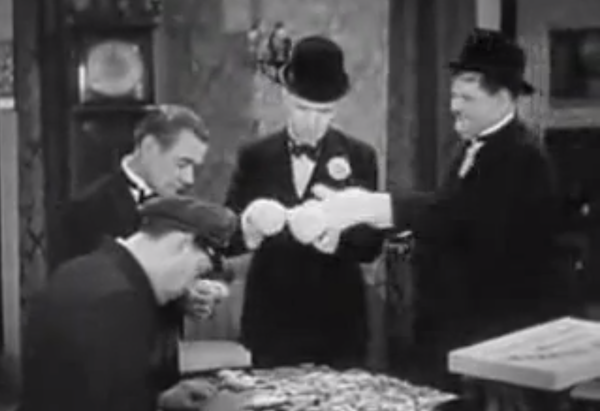
The most famous of all Laurel and Hardy’s short films, the premise of “The Music Box” is as simple as it is ingenious: two foolish delivery men - played by Stan and Ollie, of course - attempt to take a piano up an enormous stoop to a house on top of a hill.
BEST LAUREL AND HARDY MOVIES MOVIE
The movie lacks the exquisite timing of the duo’s performances of the previous decade, and often appears as though they are ripping off their own work, as if Laurel and Hardy had finally run out of ideas.Īs James Travers of French Films has noted however, the real problem with “The Big Noise” is that, for a Laurel and Hardy movie, there isn’t enough Laurel and Hardy in it, with far too much screen time given over to secondary plots and characters whose cloying wackiness doesn’t tick the box in terms of offering the kind of belly laughs that Stan and Ollie could deliver in their finest moments. “The Big Noise” has been roundly criticized for what fans see as the cynical rehashing of old jokes culled from Laurel and Hardy’s earlier movies. By the 1940s, however, things had changed for the comedy team, at least in terms of the critical response to their work. “Way Out West” was one of a slew of Laurel and Hardy movies from the 1930s that are counted among their finest.

Stan’s extended, high-pitched laughter is so infectious that you can even see the actress performing with him struggling to control her smirk.
BEST LAUREL AND HARDY MOVIES FULL
The whole movie is chock full of great gags, particularly from Laurel - his being able to inexplicably use his thumb as a lighter or attracting a pack of wild dogs after fixing a hole in his shoe with a tough steak - but nothing compares to his performance when the ruthless wife of the saloon owner tickles him ferociously in an attempt to get him to surrender the deed to her. Another classic set piece arrives a few minutes later, when Stan and Ollie join in with a rendition of “On the Trail Of The Lonesome Pine,” a song with which they will forever be associated thanks to a brilliantly funny vocal gag performed by Stan Laurel (with the aid of sound trickery). Once there, they enter a saloon, performing as they arrive an irresistibly silly dance routine to “At the Ball, That’s All,” with a Western-looking group of men sat on the porch outside. Stan and Ollie are heading to the Wild West on an important mission: to give the deed to a late man’s gold mine to his daughter, who is lodging with “guardians” in the town of Brushwood Gulch.

Opening with an instantly pleasing shot of Stan Laurel leading a donkey down a dusty road, with Oliver Hardy’s bulk being pulled behind on a makeshift sled, with Hardy smiling and dozing, “Way Out West” is a bona fide Western parody (per Empire) that contains a number of the most famous set pieces in the Boys’ entire filmography. Greatness is subjective, but when it comes to Laurel and Hardy movies, “Way Out West” is certain to feature on any fan’s must-watch list. Here is a rundown of the finest Laurel and Hardy flicks that you need to see … and those that you can guiltlessly miss.

As the hit 2018 biopic “Stan & Ollie” attests, the appeal of the famous duo is as great as ever, as new audiences continue to rediscover their timeless comedies.īut even the greats can have an off day.

Yet today, twice as many years away from the heyday of Laurel and Hardy as Vonnegut was when he wrote his book, “the Boys” are still remembered fondly. It is telling of Vonnegut’s pessimism that he also feels the need to tell us all the way back in 1976 that Laurel and Hardy are figures from “long ago,” artifacts he assumed would soon be forgotten in the ruthless future he envisioned. In 1976, the cult writer Kurt Vonnegut published his eighth novel, “Slapstick, or Lonesome No More!” It reads: “Dedicated to the memory of Arthur Stanley Jefferson and Norvell Hardy, two angels of my time.” Though the names are unfamiliar, the accompanying caricatures - in their famous bowler hats and expressing their unmistakable smiles - give away who they are: Vonnegut’s angels are Stan Laurel and Oliver Hardy, remembered today as the greatest comedy partnership Hollywood has ever known.


 0 kommentar(er)
0 kommentar(er)
